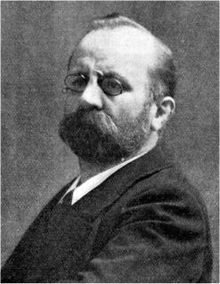Julius Buths

Julius Buths(7 May 1851 – 12 March 1920) was a German pianist, conductor and minor composer. He was particularly notable in his early championing of the works ofEdward ElgarinGermany.He conducted the continental European premieres of both theEnigma VariationsandThe Dream of Gerontius.He also had notable associations withFrederick DeliusandGustav Mahler.
Early career
[edit]Julius Emil Martin Buths was born inWiesbaden,the son of an oboist. He studied music at Cologne underFerdinand Hillerand others, in Berlin underFriedrich Kiel,in Italy and in Paris. He worked as a conductor inBreslaufrom 1875 to 1879, then inElberfelduntil 1890. That year he was appointed musical director for the city ofDüsseldorf,and he played an important role in theLower Rhenish Music Festivalsfor a number of years.[1]In 1890, he was co-director withHans Richter;in 1893 he was sole director; in 1896, he shared the role withJohannes BrahmsandRichard Strauss;1902 co-director with Strauss; and sole director in 1905.
In Düsseldorf he frequently played chamber music withMax RegerandJoseph Joachim.
Elgar
[edit]Buths was present inBirminghamat the premiere ofEdward Elgar'sThe Dream of Gerontiusin October 1900. He was very impressed with the oratorio, made the German translation of the work, and with support fromAugust Jaegerproduced its German and European premiere on 19 December 1901 in Düsseldorf; Elgar was present and wrote "It completely bore out my idea of the work: the chorus was very fine".[2]Buths produced it in Düsseldorf again on 19 May 1902 in conjunction with the Lower Rhenish Music Festival.[3][4][5][6]The soloists includedMuriel Foster,and Elgar was again in the audience, being called to the stage 20 times to receive the audience's applause.[7]This was the performance that finally convinced Elgar that he had written a truly satisfying work.[8]Buths's festival co-directorRichard Strausswas impressed enough by what he heard that, at a post-concert banquet, he said:I drink to the success and welfare of the first English progressive musician, Meister Elgar.[5]Both the 1901 and 1902 performances were sold out.[9]
In the meantime, Buths had conducted the European and German premiere of theEnigma Variations,in Düsseldorf on 7 February 1901.[5][10]
He was also responsible for the German translation and German premiere of Elgar'sThe Apostles,and the German translation ofThe Kingdom.While in Germany to conduct hisFirst SymphonyinKrefeldin December 1910, Elgar took the trouble to visit Buths in Düsseldorf.[11]Elgar also dedicated his piano pieceSkizzeto Buths.[12]
Delius
[edit]Buths' enthusiasm for English music also extended to the works ofFrederick Delius.As a pianist, he was the soloist in the first performance ofDelius's Piano Concerto in C minor,at Elberfeld in 1904, conducted byHans Haym(1860–1921).[3]He also prepared a two-piano reduction of the score.[13]He conducted the second performance ofAppalachia,at the Lower Rhenish Music Festival, in June 1905.[14]
Mahler
[edit]He conductedGustav Mahler'sResurrectionSymphonyin Düsseldorf on 3 April 1903,[15]in preparation for which he engaged in correspondence with the composer, who advised him to ensure a significant pause between the first and second movements.[16]Buths nevertheless inserted the long pause (five minutes) between the fourth and fifth movements, for which Mahler congratulated him on his insight and sensitivity, and courage in daring to ignore the composer's wishes.[17]
In 1906, along withOssip Gabrilowitsch,Alban BergandOskar Fried,he attended the rehearsals for the premiere of Mahler'sSixth SymphonyinEssenand they all dined with the composer.[15]
First performances
[edit]Julius Buths' other first performances as a conductor included the Düsseldorf premieres of
- Johann Sebastian Bach'sMass in B minor
- Hector Berlioz'sLa damnation de FaustandGrande Messe des Morts
- Giuseppe Verdi'sRequiem
and the German premiere ofCharles Villiers Stanford'sRequiem,Op. 63.
He composed a Piano Concerto in D minor, a cantataRinaldo,a string quartet, a piano quintet, some songs and instrumental pieces.[3]
In 1902 he became Director of theDüsseldorf Conservatory,in which post he remained until 1908. He died there in 1920, aged 68.
References
[edit]- ^Eric Blom,ed.,Grove Dictionary of Music and Musicians,5th ed., 1954, Vol. 1, p. 1048
- ^Howard E. Smith, A History of the Oratorio
- ^abcAnswers
- ^Presto Classical
- ^abcElgar,W. H. Reed
- ^The Victorian Web: Sir Edward Elgar and His World: A Selective Chronology
- ^"Grant Park Music Festival"(PDF).Archived fromthe original(PDF)on 24 February 2012.Retrieved27 April2010.
- ^Music Web International: Elgar’s Blessed Charmer – Muriel Foster
- ^choirs.org.uk
- ^"Philharmonia"(PDF).28 September 2011. Archived fromthe original(PDF)on 28 September 2011.
- ^Simon Mundy, Elgar
- ^noeartlycity
- ^National Library of Australia Catalogue
- ^Jones, Philip (1986)."Delius's American Rhapsody".The Musical Times.127(1726): 677–679.doi:10.2307/964664.ISSN0027-4666.JSTOR964664.
- ^abde La Grange, Henry-Louis (1995).Gustav Mahler: Volume 3. Vienna: Triumph and Disillusion (1904-1907).OUP Oxford.ISBN978-0-19-315160-4.
- ^"Program Notes".San Francisco Symphony.Archived fromthe originalon 24 February 2012.Retrieved27 April2010.
- ^Kennedy Center
- 1851 births
- 1920 deaths
- Musicians from Wiesbaden
- People from the Duchy of Nassau
- German classical pianists
- German male classical pianists
- German conductors (music)
- German male conductors (music)
- German composers
- Edward Elgar
- 19th-century classical pianists
- 19th-century German musicians
- 19th-century German male musicians
